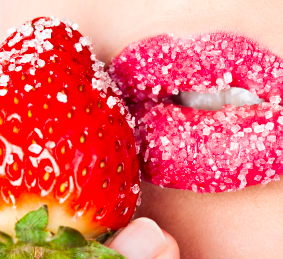When it comes to kicking unhealthy eating habits to the curb, going on a detox from sugar is the one I hear about the most. It seems like people are always trying to give up sugar. The reason it’s so tough to give it up is because it’s super addictive! Sugar can lead to all kinds of health problems, but for me the main reason I try to keep sugar out of my life is primarily emotional. The “sugar blues” is something I understand all too well. When I first started eating healthier, I cut out sugar completely for about 6 months – and the first time I had it again, well…you can read more about that not-so-awesome experience here!
Anyway, my friend and fellow IIN health coach Julian Grow is currently on a detox from sugar (all sugar – including fruit)! Julian is really enthusiastic about health and nutrition, and his excitement always gets me amped up – so I wanted to dig a little deeper and share his detox experience with you guys!
It gets a little intense in here, so get ready. :)

Jenny: Julian, tell me about the sugar detox you’re doing. How did you get interested in this? What does it entail?
Julian: I‘d heard about people coming off of fruits and all other forms of sugar for a short period of time (a few days to a few weeks) to lower their dependence on sugar, but I had never really learned the specifics of why that was beneficial. I got the book Rainbow Green Live-Food Cuisine by Dr. Gabriel Cousens (one of my favorite raw food detoxification gurus, so to speak), and found out what he had to say about it.
I am doing what he calls Phase 1 of the Rainbow Green Live-Food Cuisine diet, which entails a 90 day to 6 month fast from all forms of sugars – including fruits, sweet vegetables such as carrots, beets, etc, as well as fermented foods such as miso, sauerkraut, apple cider vinegar, kefir, etc. Lemons and limes are the only fruits allowed (aside from fruits with no sugar, like avocados and tomatoes). I should also add that this is a 100% raw vegan diet.
If I were to try to sum up Dr. Cousens’ extremely detailed scientific explanation of a sugar detox, the general idea is that an acidic diet of too many toxic foods and high sugar foods causes the cells in the body to be stressed. This causes cells to deteriorate and eventually turn into viruses, bacteria, fungus and mold in the body, which rapidly increases aging and leads to chronic disease.
Basically, a sugar detox gives your body the chance to reset, slow aging and put the body under less stress.
Jenny: Whoa! OK. Who should go on a sugar detox, and why?
Julian: I’m not entirely sure if I would say anyone should go on a sugar detox, other than people with chronic diseases and those choosing to obtain a higher level of health – if they’re ready to commit to it. In my opinion, this will be easier for someone who has already been down the raw food and detoxification route before, or at least adopted a mostly healthy lifestyle and is prepared to face cravings and discomfort for a few days.
There are a number of detox symptoms when you cut sugar out of your diet — including mood swings, fatigue and extreme sugar cravings. Most of the detox symptoms went away entirely after Day 5 for me.
Jenny: What benefits have you experienced since embarking on this detox?
Julian: The benefits I have noticed from the sugar detox are serious mental clarity like never before, the ability to concentrate better during meditation and in general, and a much more grounded feeling than usual – remaining in a comfortable, stabilized, sense of peace. In my opinion this comes from the theory that foods that grow out of the ground keep you grounded. Because I primarily am eating foods that grow out of the ground – leafy greens like kale and collard greens- I feel more stable and confident than ever.
Jenny: What are some of the foods you’ve found to be great healthy alternatives for a sweet tooth?
Julian: Ya know, I’m so glad you asked! I have found that liquid stevia extract is my most go to sweet option because I can use a lot of it. I know that there are a number of people who dislike stevia and feel that it tastes artificial, but because it’s so sweet, if you only use a few drops in a smoothie you barely taste the aftertaste.
There are also some newer stevia products on the market – even stevia haters are saying they taste pretty awesome! My favorite so far is the chocolate flavored stevia by the company Sweet Leaf.
Another great sweet alternative that I use is Birch Xylitol. It tastes just like sugar and looks like it, but doesn’t spike your glycemic index levels at all! I’m huge on it, but don’t go too crazy with it, it can give you some serious gas or even diarrhea because it is a sugar alcohol. Make sure you get the birch rather than the corn xylitol.
I make sweet superfood green smoothies in the morning, which satisfy my sweet tooth, but a really satisfying quick fix is coconut milk with just a little stevia or xylitol and vanilla extract. I’ve been getting really creative with making sugar free drinks — everything from vanilla cinnamon shakes to chocolate peppermint pattie smoothies.
You’d be surprised how well you can eat, even when you take away so much of what you’re used to.
Jenny: Do you have any basic tips for someone who wants to ease into eating less sugar?
Julian: One tip I think is useful to someone who wants to ease in to eating less sugar is to be aware of the yin/yang balance of sweet and salty. The more contractive, salty, “yang” foods you eat the more you will crave expansive, sweet, “yin” foods. One strategy is to eat neutral foods such as whole grains, leafy greens, and root vegetables which encompass both yin and yang qualities so as not to create an imbalance.
Also, when dehydrated, the body instinctually craves sweets, knowing that there is a large amount of water in fruits. So staying hydrated is super important.
Lastly, foods that have a large amount of minerals minimize cravings for sweets. Examples are raw cacao (super high in magnesium, chromium, iron and zinc), spirulina, and sea vegetables like kelp and dulse. Getting a high quality, easily absorbable multi-vitamin like New Chapter Organics or Garden of Life can help too.
Jenny: Wow – this is a lot to think about! Anything else you’d like to share?
Julian: Did you just ask me if I could keep talking?! Of course I will!
If you’re reading this, I know you’re awesome, and clearly a highly conscious, driven person on a journey of healing and reaching your fullest potential — so I’m excited and honored to be a small part of your world. If anyone is interested in raw food or becoming healthier feel free to message me and we’ll talk! Web site – YouTube – Facebook
I highly recommend reading the book Conscious Eating by Dr. Gabriel Cousens for a super in-depth look at how to customize and create a diet for yourself, and master the art of feeding yourself.
Julian received his training from the Institute for Integrative Nutrition. He currently teaches a weekly Revitalizing Health Strategies workshop at Studio Yoga in Madison, NJ. Julian is passionate about helping his clients see the impact that food has on the body, mind and spirit.



Emma says
thanks for sharing this post! I’ve read so much about no-sugar diets lately so am quite curious. I don’t like to add any form of sweetener to my food but I do eat a LOT of fruit. Personally I don’t feel that I have any sugar cravings that are beyond healthy/intuitive so don’t feel a strong need to go sugar-free, but I really appreciate Julian’s non-judgemental way of experimenting with the diet. Others can be so dogmatic! Maybe one day I’ll try it out :) xx